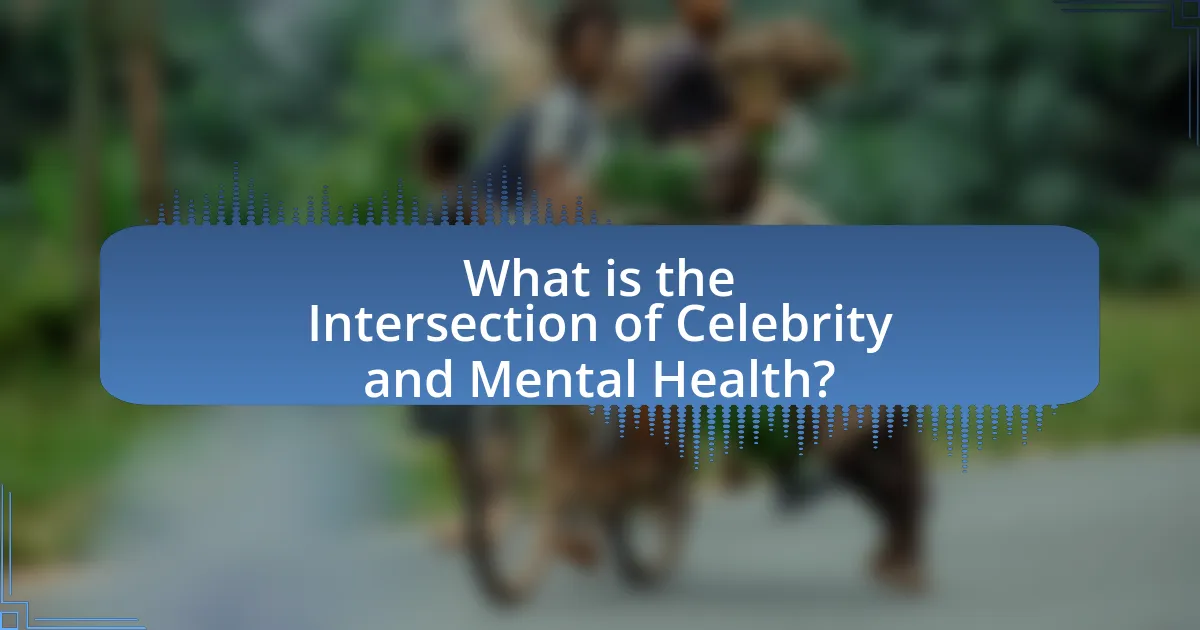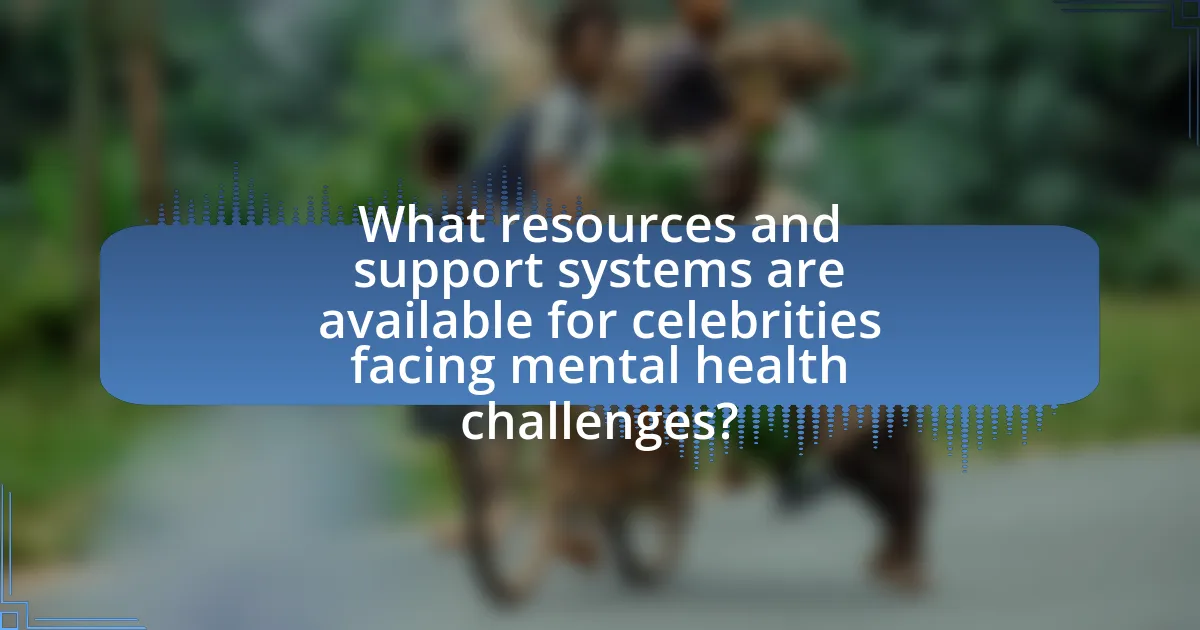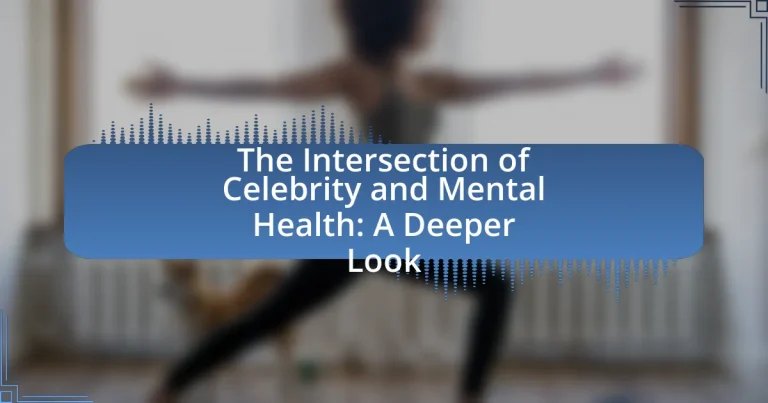The article examines the intersection of celebrity and mental health, highlighting the unique pressures public figures face that can lead to mental health challenges such as anxiety, depression, and substance abuse. It discusses how celebrities influence public perceptions of mental health through their openness, the role of media in shaping these perceptions, and the impact of celebrity endorsements on mental health awareness. Additionally, the article explores the common mental health issues faced by celebrities, the implications of their struggles on their careers, and the resources available to support them. It emphasizes the importance of support networks and the lessons the general public can learn from celebrities’ experiences with mental health.

What is the Intersection of Celebrity and Mental Health?
The intersection of celebrity and mental health involves the unique pressures and scrutiny that public figures face, which can significantly impact their mental well-being. Celebrities often experience heightened stress due to constant media attention, public expectations, and the demands of their careers, leading to mental health issues such as anxiety, depression, and substance abuse. Research indicates that approximately 20% of celebrities report experiencing mental health challenges, highlighting the prevalence of these issues in the entertainment industry. Furthermore, the stigma surrounding mental health can prevent celebrities from seeking help, exacerbating their struggles.
How do celebrities influence public perceptions of mental health?
Celebrities significantly influence public perceptions of mental health by leveraging their platforms to raise awareness and reduce stigma. When high-profile individuals openly discuss their mental health struggles, such as anxiety or depression, they normalize these experiences and encourage fans to seek help. For instance, a study published in the journal “Psychological Medicine” found that celebrities who share their mental health journeys can lead to increased public interest in mental health resources, with a notable spike in searches for mental health services following such disclosures. This visibility can foster a more supportive environment, prompting conversations that challenge societal norms surrounding mental health.
What role does media play in shaping these perceptions?
Media plays a crucial role in shaping perceptions of mental health, particularly in the context of celebrity culture. Through various platforms, media disseminates narratives that can either stigmatize or normalize mental health issues. For instance, studies show that positive portrayals of celebrities discussing their mental health struggles can lead to increased public awareness and reduced stigma, as evidenced by the rise in conversations around mental health following high-profile disclosures by figures like Demi Lovato and Prince Harry. Conversely, sensationalized or negative portrayals can perpetuate stereotypes and misinformation, influencing public attitudes and beliefs about mental health. Thus, the media’s framing of mental health issues significantly impacts societal perceptions and understanding.
How do celebrity endorsements impact mental health awareness?
Celebrity endorsements significantly enhance mental health awareness by leveraging their influence to reach broader audiences. Research indicates that when celebrities openly discuss mental health issues, it reduces stigma and encourages individuals to seek help. For instance, a study published in the Journal of Health Communication found that celebrity involvement in mental health campaigns led to a 25% increase in public engagement with mental health resources. This demonstrates that celebrity endorsements can effectively normalize conversations around mental health, making it more acceptable for individuals to address their own mental health challenges.
Why is mental health a significant issue among celebrities?
Mental health is a significant issue among celebrities due to the immense pressure and scrutiny they face in the public eye. This constant exposure can lead to anxiety, depression, and other mental health challenges, as evidenced by studies showing that individuals in high-stress professions, including entertainment, report higher rates of mental health disorders. For instance, a survey by the American Psychological Association found that 61% of entertainers experience anxiety, compared to 40% in the general population. Additionally, the stigma surrounding mental health can prevent celebrities from seeking help, exacerbating their struggles.
What unique pressures do celebrities face that affect their mental health?
Celebrities face unique pressures such as intense public scrutiny, lack of privacy, and the constant demand for perfection, all of which significantly impact their mental health. The relentless media attention can lead to anxiety and depression, as seen in studies indicating that high-profile individuals often experience higher rates of mental health issues compared to the general population. Additionally, the pressure to maintain a certain image and the fear of negative publicity can exacerbate feelings of isolation and stress, contributing to mental health struggles.
How does the lifestyle of a celebrity contribute to mental health challenges?
The lifestyle of a celebrity significantly contributes to mental health challenges due to constant public scrutiny, high-pressure environments, and a lack of privacy. Celebrities often face relentless media attention and social media criticism, which can lead to anxiety, depression, and feelings of inadequacy. For instance, a study published in the Journal of Health Psychology found that individuals in the public eye are more susceptible to mental health issues due to the stress of maintaining their public image and the fear of negative feedback. Additionally, the fast-paced lifestyle, including irregular schedules and substance use, can exacerbate mental health problems, as evidenced by numerous reports of addiction and burnout among high-profile figures.
What are the common mental health issues faced by celebrities?
Common mental health issues faced by celebrities include anxiety, depression, substance abuse, and eating disorders. These issues often stem from the intense pressure, scrutiny, and expectations that come with fame. For instance, a study published in the Journal of Affective Disorders found that individuals in the entertainment industry are at a higher risk for mood disorders compared to the general population. Additionally, high-profile cases, such as those of celebrities like Robin Williams and Britney Spears, highlight the prevalence of these mental health challenges in the celebrity community.
How do anxiety and depression manifest in the lives of celebrities?
Anxiety and depression manifest in the lives of celebrities through various symptoms, including public breakdowns, substance abuse, and withdrawal from social engagements. For instance, high-profile figures like Britney Spears and Kanye West have openly discussed their struggles with mental health, illustrating how the pressures of fame can exacerbate these conditions. Research indicates that celebrities often face unique stressors, such as intense scrutiny and lack of privacy, which can lead to heightened anxiety and depressive episodes. A study published in the Journal of Affective Disorders found that individuals in the entertainment industry report higher rates of anxiety and depression compared to the general population, highlighting the significant impact of their lifestyle on mental health.
What are the implications of substance abuse among celebrities?
Substance abuse among celebrities leads to significant implications, including deteriorating mental health, public scrutiny, and potential legal consequences. The high-pressure environment of fame often exacerbates underlying mental health issues, resulting in increased rates of anxiety, depression, and addiction. For instance, a study published in the Journal of Substance Abuse Treatment found that individuals in the entertainment industry are at a higher risk for substance use disorders compared to the general population. Additionally, the public nature of their struggles can lead to intense media scrutiny, which may further impact their mental well-being and career. Legal issues often arise from substance-related incidents, leading to arrests or loss of professional opportunities, as seen in cases involving high-profile figures like Lindsay Lohan and Charlie Sheen.
How does the public’s perception of celebrity mental health evolve?
The public’s perception of celebrity mental health evolves through increased awareness and openness about mental health issues, influenced by social media and public discussions. Over the past decade, high-profile celebrities have shared their mental health struggles, such as depression and anxiety, which has contributed to reducing stigma and fostering empathy among the public. For instance, studies show that when celebrities like Demi Lovato and Prince Harry openly discuss their mental health challenges, it encourages fans to seek help and engage in conversations about mental well-being. This shift reflects a broader societal trend towards recognizing mental health as a critical aspect of overall health, leading to more supportive attitudes and advocacy for mental health resources.
What factors contribute to changing attitudes towards mental health in celebrities?
Changing attitudes towards mental health in celebrities are influenced by increased public discourse, social media visibility, and advocacy efforts. Increased public discourse has led to a greater understanding of mental health issues, as seen in campaigns like Mental Health Awareness Month, which encourages open conversations. Social media visibility allows celebrities to share personal experiences, reducing stigma; for example, figures like Selena Gomez and Dwayne Johnson have openly discussed their mental health struggles, fostering relatability and support. Advocacy efforts by organizations such as the National Alliance on Mental Illness (NAMI) further promote mental health awareness, encouraging celebrities to use their platforms for positive change. These factors collectively contribute to a more accepting and informed attitude towards mental health in the celebrity sphere.
How has social media impacted the conversation around celebrity mental health?
Social media has significantly amplified the conversation around celebrity mental health by providing a platform for open dialogue and increased visibility. Celebrities often share their personal struggles with mental health on platforms like Instagram and Twitter, which normalizes these discussions and encourages fans to engage with the topic. For instance, high-profile figures such as Selena Gomez and Dwayne “The Rock” Johnson have openly discussed their mental health challenges, leading to increased public awareness and reducing stigma. Research indicates that social media can foster supportive communities, as seen in studies showing that online discussions about mental health can lead to greater empathy and understanding among users.
What role do public figures play in destigmatizing mental health issues?
Public figures play a crucial role in destigmatizing mental health issues by using their platforms to raise awareness and promote open discussions. Their visibility and influence can challenge societal norms and misconceptions surrounding mental health, making it more acceptable for individuals to seek help. For instance, celebrities like Demi Lovato and Prince Harry have openly shared their mental health struggles, which has led to increased public dialogue and understanding. Research indicates that when well-known individuals speak about their experiences, it can significantly reduce stigma; a study published in the Journal of Health Communication found that celebrity endorsements can positively impact public attitudes toward mental health.
How do celebrity mental health struggles affect their careers?
Celebrity mental health struggles can significantly impact their careers by influencing public perception, job opportunities, and personal well-being. When celebrities openly discuss their mental health issues, it can lead to increased empathy and support from fans, but it may also result in stigma or negative media coverage that affects their marketability. For instance, a study published in the Journal of Health Psychology found that public figures who disclose mental health challenges often face a dual response: while some fans appreciate their honesty, others may question their professionalism or reliability. This complex dynamic can lead to reduced roles in high-profile projects or changes in brand partnerships, ultimately affecting their career trajectory.
What are the potential consequences of mental health issues on a celebrity’s public image?
Mental health issues can significantly damage a celebrity’s public image by leading to negative perceptions and reduced fan support. When celebrities openly struggle with mental health, they may face stigma, which can result in public backlash or diminished career opportunities. For instance, high-profile cases like Britney Spears and Kanye West illustrate how mental health challenges can lead to media scrutiny and public misunderstanding, impacting their professional endeavors and personal lives. Additionally, research indicates that 61% of individuals believe that mental health issues can negatively affect a celebrity’s reputation, highlighting the societal tendency to judge based on mental health struggles.
How can recovery from mental health issues influence a celebrity’s career trajectory?
Recovery from mental health issues can significantly enhance a celebrity’s career trajectory by fostering resilience, increasing public empathy, and opening new opportunities for advocacy. Celebrities who openly discuss their recovery often gain a supportive fan base, which can lead to increased visibility and demand for their work. For instance, figures like Demi Lovato and Selena Gomez have used their experiences to connect with audiences, resulting in successful music careers and speaking engagements. Additionally, research indicates that public figures who share their mental health journeys can reduce stigma, encouraging others to seek help, which can further solidify their influence and relevance in the industry.

What resources and support systems are available for celebrities facing mental health challenges?
Celebrities facing mental health challenges have access to various resources and support systems, including mental health professionals, peer support groups, and wellness programs tailored for high-profile individuals. Mental health professionals, such as therapists and psychologists, often specialize in working with celebrities to address unique pressures and public scrutiny. Peer support groups, like those offered by organizations such as the National Alliance on Mental Illness (NAMI), provide a safe space for celebrities to share experiences and coping strategies with others who understand their challenges. Additionally, wellness programs, including retreats and workshops focused on mental health, are designed specifically for the entertainment industry, helping celebrities manage stress and promote overall well-being. These resources are critical in providing the necessary support for celebrities to navigate their mental health issues effectively.
What types of therapy and treatment options are commonly utilized by celebrities?
Celebrities commonly utilize various types of therapy and treatment options, including cognitive behavioral therapy (CBT), psychotherapy, mindfulness-based therapy, and holistic approaches such as yoga and meditation. Cognitive behavioral therapy is particularly favored for its structured approach to addressing negative thought patterns, while psychotherapy provides a space for deeper emotional exploration. Mindfulness-based therapy helps in stress reduction and emotional regulation, which is crucial for high-pressure lifestyles. Holistic approaches, including yoga and meditation, are often integrated to promote overall well-being. These methods are supported by numerous studies indicating their effectiveness in managing mental health issues, particularly in high-stress environments typical for celebrities.
How do celebrities find and choose mental health professionals?
Celebrities typically find and choose mental health professionals through referrals from trusted sources, such as friends, family, or other industry professionals. This method is often preferred due to the need for confidentiality and the desire for a therapist who understands the unique pressures of fame. Many celebrities also conduct thorough research, including checking credentials, specialties, and reviews, to ensure they select a qualified professional who aligns with their specific needs. Additionally, some may utilize networks or organizations that cater specifically to high-profile individuals, providing access to vetted mental health experts.
What role do support networks play in a celebrity’s mental health journey?
Support networks play a crucial role in a celebrity’s mental health journey by providing emotional support, validation, and a sense of belonging. These networks, which often include family, friends, and mental health professionals, help celebrities navigate the unique pressures of fame, such as public scrutiny and isolation. Research indicates that strong social support can significantly reduce the risk of mental health issues; for instance, a study published in the Journal of Health and Social Behavior found that individuals with robust support systems experience lower levels of depression and anxiety. Thus, the presence of a reliable support network is essential for celebrities to maintain their mental well-being amidst the challenges of their public lives.
What can the general public learn from celebrities’ experiences with mental health?
The general public can learn that celebrities’ experiences with mental health can destigmatize mental illness and promote open conversations. High-profile individuals like Demi Lovato and Prince Harry have openly discussed their struggles, which helps normalize these issues and encourages others to seek help. Research indicates that public figures sharing their mental health journeys can lead to increased awareness and understanding, as seen in a study published in the Journal of Health Communication, which found that celebrity disclosures can significantly influence public attitudes towards mental health.
How can individuals apply lessons from celebrity mental health stories to their own lives?
Individuals can apply lessons from celebrity mental health stories by recognizing the importance of vulnerability and seeking help. Celebrities often share their struggles with mental health, which can normalize these experiences and encourage others to address their own challenges. For instance, when celebrities like Selena Gomez and Dwayne “The Rock” Johnson openly discuss their mental health issues, it highlights that mental health struggles are common and can affect anyone, regardless of status. This visibility can motivate individuals to seek therapy, engage in self-care, and foster open conversations about mental health in their own lives.
What best practices can be adopted for promoting mental health awareness inspired by celebrities?
Promoting mental health awareness inspired by celebrities can be effectively achieved through several best practices. First, celebrities can openly share their personal mental health struggles, which humanizes the issue and encourages fans to seek help. For instance, when celebrities like Selena Gomez and Dwayne “The Rock” Johnson discuss their mental health challenges, it reduces stigma and fosters a supportive environment.
Second, celebrities can leverage their platforms to advocate for mental health resources, such as hotlines and support groups, thereby directing their audience to professional help. Research indicates that public figures endorsing mental health initiatives can significantly increase awareness and engagement; for example, the “Bell Let’s Talk” campaign in Canada, which features various celebrities, has raised millions for mental health programs.
Third, celebrities can participate in or host events that promote mental health awareness, such as charity runs or mental health summits, which not only raise funds but also create community dialogue around mental health issues. These events can lead to increased visibility and understanding of mental health topics.
Lastly, collaborating with mental health organizations allows celebrities to provide credible information and resources to their followers, enhancing the impact of their advocacy. For example, the partnership between mental health organizations and celebrities during Mental Health Awareness Month has proven effective in reaching wider audiences.
